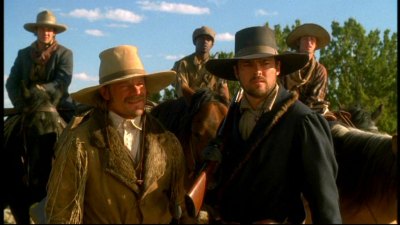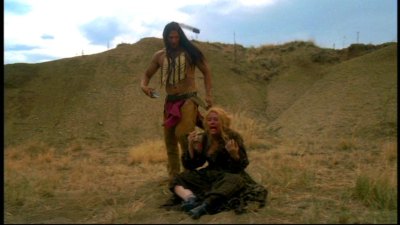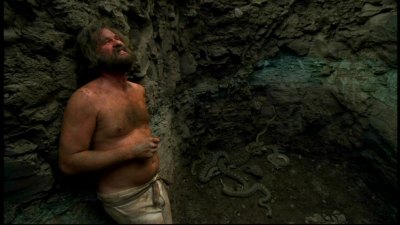| Reviews & Columns |
|
Reviews DVD TV on DVD Blu-ray 4K UHD International DVDs In Theaters Reviews by Studio Video Games Features Collector Series DVDs Easter Egg Database Interviews DVD Talk Radio Feature Articles Columns Anime Talk DVD Savant Horror DVDs The M.O.D. Squad Art House HD Talk Silent DVD
|
DVD Talk Forum |
|
|
| Resources |
|
DVD Price Search Customer Service #'s RCE Info Links |
|
Columns
|
|
|
Comanche Moon: The Second Chapter in the Lonesome Dove Saga
I didn't catch Comanche Moon, the expensive three-night Western miniseries that CBS aired this past January, but I was a big fan of this prequel's inspiration, Lonesome Dove, so I was curious to check out the new Sony DVD release. Unfortunately, Larry McMurtry's Comanche Moon (whose bankable name is curiously absent from the front cover of the DVD) doesn't come near the original, with only one truly interesting performance (the always amusing Val Kilmer), a reasonable but uninspired impression (Steve Zahn channeling Robert Duvall), and a fatally fractured narrative that renders the entire third act largely anticlimactic.

Set in 1858, Comanche Moon looks back at an earlier chapter in the lives of Texas Rangers Gus McCrae (Steve Zahn) and Woodrow F. Call (Karl Urban). Marshaled under the command of Captain Inish Scull (Val Kilmer), Call and McCrae and small group of Rangers are following Buffalo Hump (Wes Studi), a renegade Comanche Indian. However, when Kicking Wolf (Jonathan Joss), the best horse thief in the Comanche nation, steals eccentric Captain Scull's beloved war horse, Hector, Scull, in a splashy bit of deranged bravado, decides to test himself against the Comanche warriors by tracking them on foot, without his Rangers and with the help of neutral Kickapoo tracker Famous Shoes (David Midthunder). With Call and McCrae now Captains in the Rangers, they lead their small troop back to Austin to await further orders.
Romantic complications await both of them there. Call's lover, Maggie (Elizabeth Banks), the local whore, becomes pregnant with Call's baby, which does little to change the reluctant, commitment-shy cowboy to settle down and marry her. Likewise unlucky in love, Gus' pursuit of Clara Forsythe (Linda Cardellini) is dogged by Gus' constant missteps and miscalculations in the finer points of romance - including sleeping with the sexually insatiable wife of Captain Scull, Inez Scull (Rachel Griffiths). Luckily, action calls when Texas Governor Elisha Pease (James Rebhorn) informs the men that Captain Scull has been kidnapped by sadistic, torturing Mexican bandito Ahumado, the "Black Vaquero," (Sal Lopez), who is keeping Scull in hopes of scoring a large ransom. Further complicating matters is the drama unfolding in Buffalo Hump's family. His son, Blue Duck (Adam Beach), has turned against his father and gone off as a renegade, torturing and raping settlers at a pace that is sure to bring down the wrath of the United States Army.
SPOILERS ALERT!
Sidestepping for a moment the issue of plugging different actors into roles made famous by established stars in a previous incarnation, Comanche Moon's only interesting subplot is courtesy of Val Kilmer and his enjoyably eccentric take on Captain Scull. Kilmer, long past worrying about his former matinee idol looks (he's believably stout in his stripped down scenes) creates a memorably vainglorious Scull, an accomplished snob who looks at each man he encounters to see if they can offer him the slightest bit of original thinking or a poetic glimpse of philosophizing that he so obviously prizes (few do). Enacting a character who is constantly pushing himself to live a life on the edge, Kilmer, who was genuinely brilliant in the Western pulp classic, Tombstone, provides about the only juice in the otherwise lackluster, solemn Comanche Moon, unless you count the equally flamboyant (but seriously one-dimensional) sexual hellcat role of Inez Scull, done well enough by Griffiths.

As for the two leads, Zahn and Urban are swimming against an almost impossibly strong current of the audience's fond memories of their earlier Lonesome Dove inspirations, Robert Duvall and Tommy Lee Jones. Zahn does a reasonable facsimile of Duvall's recognizable mannerisms (you can tell Zahn must have watched hours of Duvall to get them down right), but ultimately, such a take on an established character is a double-edge sword. We feel initial admiration for the effort, but ultimately, it only makes us wish we were watching the real thing. Better Zahn had just tried his own take on the role - which Urban does, but unfortunately to almost no effect. Stolid instead of stoic, Urban is about as animated and engaging as a fence post, and together, the two actors make for a less-than-impressive Western duo.
Comanche Moon's politics are noticeably calcified, as well. While an occasional effort to be even-handed in the motivations of both cowboy and Indian is applied (i.e.: this is a primitive world, and survival is the only "good and evil" here), the film still tries to soften and ameliorate its politically correct take on the Comanche abuses of women it depicts. While the film wants to subtly scold the racist, misogynist frontier society at the time that treated all white women raped by Indians as "defiled" and therefore undesirable as potential wives, the film is also careful not to show the rampaging Comanche actually raping these women (usually in front of their children). The camera quickly cuts away, or comes onto the scene after the act, and then ignores the implications (and condemnations) of such an Indian society that not only saw rape as a desirable method of terrorism and warfare, but also the kidnaping and enslaving of women (both white and other Indian tribeswomen) for sexual purposes, as well as for religious-based torture. The film's scorn is directed at the whites' disgraceful betrayal of the Indians (a flashback shows a slaughter of Comanche Indians under a white flag truce), but no such judgment is made about certain problematic (and reprehensible) aspects of Indian culture that are realized - and not commented on - in the film (see "Extras" below).
Leaving politics aside, Comanche Moon commits the worst dramatic sin of all: it peaks too early, and leaves the third act as a distinct (and largely unconnected) let-down. The first two parts of this 284 minute miniseries at least stay on track chronologically, following the efforts of Gus and Call to rescue Scull (Kilmer has a field day with the torture scenes, playing nicely off intense Lopez's Ahumado characterization). But when the third act commences, seven whole years have passed. The Civil War is over, and it's time to watch Gus and Call take stock of their failed romances (Gus is mourning a wife that we never even see, rendering his scenes grieving over her largely pointless and uninvolving) before they rally one last time to try and bring down Blue Duck and Buffalo Hump. Too much is left unexplained or unrealized for us to ultimately care about these later years, and Comanche Moon, which wasn't all that dynamic in the first place, ends with a whimper.

The DVD:
The Video:
The anamorphically enhanced, 1.78:1 widescreen transfer for Comanche Moon is pert near flawless, with absolutely no compression issues to speak off (spreading it over two discs helps), and beautifully rendered color values. A super-sharp picture.
The Audio:
The Dolby Digital English 5.1 soundtrack delivers a goodly amount of separation during the action sequences, and delivers crisp, clear dialogue. English and French subtitles are included.
The Extras:
Three extra featurettes are included in this two-disc edition of Comanche Moon. Behind the Scenes of Comanche Moon runs 7:29, and features the leads and some of the creative team discussing the project and its production history. Riding into the Sunset: Cowboy & Riding Training runs 5:46 and looks at the training techniques that went into getting the Hollywood actors up to speed on looking like real cowboys. And Comanche Heritage, running 5:47, looks at the production's appreciation for the Comanche heritage, and its respectful inclusion of its customs into the film. However, statements such as these, by Jonathan Joss - "You hear a lot about Comanches, and usually what you hear about them is in some fields you would say is a negative type of approach to a fierce warrior, a fierce guerilla war fighter. It's not a stereotype that's untrue. You know we care about our lands, we care about our people, we cared about our issues. And sometimes when you have such a love and a demanding sense to express; when we would do something, whether it be for good or for bad; what we left behind, whether it be a mutilated body or it would be a burnt town building, it was our expression, our palate. I like to think of Comanche people as being almost artists," need to be seriously challenged in today's timid, politically correct times - something Comanche Moon is reluctant to do, as well.
Final Thoughts:
A typically eccentric, enjoyable performance by Val Kilmer can't hold together Comanche Moon, which shifts jarringly between subplots that aren't fully realized (or are that particularly interesting). And a potential for tit-for-tat fairness in exploring the complicated motives of brutality on the frontier between the white man and Indians is ultimately tossed away for easy, one-sided condemnation. Worst of all for a Western, Comanche Moon is terminally slow and drawn out. Western fanatics (and I count myself among that group) will certainly want to view this, but I suggest a rental first; I suspect that's all most of you will need here.
Paul Mavis is an internationally published film and television historian, a member of the Online Film Critics Society, and the author of The Espionage Filmography.


|
| Popular Reviews |
| Sponsored Links |
|
|
| Sponsored Links |
|
|
| Release List | Reviews | Shop | Newsletter | Forum | DVD Giveaways | Blu-Ray | Advertise |
|
Copyright 2024 DVDTalk.com All Rights Reserved. Legal Info, Privacy Policy, Terms of Use,
Manage Preferences,
Your Privacy Choices | |||||||















